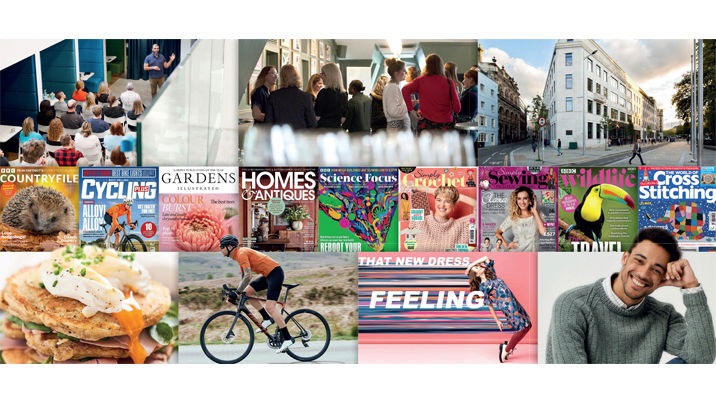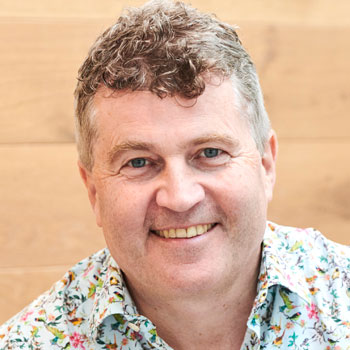
Back in the mid-nineties, a young publisher decided to build a business based on specialist magazines. Andy Marshall, together with Kevin Cox, set up Origin Publishing and their very first launch was into the craft sector with The World of Cross Stitching.
Today, that magazine brand is still going strong, although in the intervening three decades, its parent company has been through several different iterations. The latest of these is Our Media, a multi-brand, multi-platform publisher, with Marshall still at the helm.
Marshall recalls how, following that first successful launch, Origin went on to acquire Koi, Ponds & Gardens magazine, at a time when Charlie Dimmock and her Garden Rescue team were making water gardening hugely popular. The company soon added 220 Triathlon as a distress purchase and before they knew it, had built up a £10m business based in Bristol.
BBC links
They noticed that BBC Wildlife magazine was sitting all alone in the Natural History Unit in the city and wondered if the Corporation might be interested in partnering with them. At the time, the BBC responded by saying they couldn’t licence the brand, but the following year, they came back to Origin and asked whether they would be interested in becoming part of BBC Worldwide looking after their specialist magazines. In 2004, the BBC acquired Origin, which took over the running of BBC Music, History and Wildlife magazines. All was going well until 2006, when questions began to be asked about whether being involved in private marketplaces was really part of the BBC’s remit. There was a partial management buyout of those brands which it was felt did not fit within the remit.

Marshall continued heading up Origin Publishing, now independent once more, as well as overseeing BBC Magazines Bristol. Then in 2011, BBC Worldwide decided to get out of magazines altogether and all the titles were sold to a private equity firm, Exponent. Origin and BBC Magazines Bristol joined with the BBC’s publishing arm in London to form Immediate Media. “That was a wonderful ten years. The cultures really fitted, and we had a great time working in London and Bristol,” says Marshall.
In 2017, the German Burda Group bought Immediate and decided to focus on its biggest brands including BBC Good Food and the Radio Times. “That presented us with an opportunity where we were moving towards taking some of the smaller brands out of that group,” says Marshall. In October 2023, they did exactly that and Our Media was born. “What’s nice about the business is that we’ve been successful in each iteration. The people have demonstrated we can adapt, so here we are at the next stage,” he adds.
They began by making some tough decisions of their own, selling 220 Triathlon to Kelsey Publishing. “We have to cut our cloth according to what we can manage. We felt we couldn’t give enough time and attention to 220 Triathlon. We spoke about it with Kelsey and we felt it was going to thrive more in that environment,” Marshall explains.
The World of Cross Stitching is still going strong however, alongside titles such as Simply Crochet, as well as some remaining BBC titles including Countryfile and Sky at Night Magazine, and successful specialist brands Gardens Illustrated, Cycling Plus and Homes & Antiques. In total, Our Media employs some 350 people at its Bristol headquarters working on more than twenty brands with annual revenues of £40m.
“We’re still publishing magazines we had in the late 90s. They have developed into multi-platform brands. They are still after all this time dynamic media brands that serve their markets. Some of our subscribers have been with us since that first issue,” explains Marshall.
There were several issues they had to address coming out of a bigger media group to ensure they could run as an independent business. It was inevitable that they had relied on certain functions at group level. For example, they have had to invest in digital expertise to run their websites outside of Immediate. The aim is to grow a business which is the right size for what they want to achieve.
New era, new strategy
A new era calls for a strategy to match a very different media scene. There are three strands to this. Firstly, to produce brilliant, trusted content. “We believe trust is a commodity which is becoming scarcer in the world of disinformation. We believe it will become more valuable,” says Marshall.
Working in specialist media makes it especially important to ensure that information is as accurate as possible. For example, The World of Cross Stitching needs to make sure its patterns are accurate and that the list of what readers will need is detailed and complete. With BBC Science Focus, it means ensuring they are talking to proper scientists and presenting information in a way that is both accessible to the audience and accurate.
The second strand of their strategy is to amplify this content to a variety of platforms, including print, and digital in all its forms. A vital part of this is ensuring that when people consume their content, they know it comes from them, something that is under threat from the rapid development of AI which scrapes information from various sources and packages it together.
“How do we let people know it’s our content? In the old days, it was just a magazine. Now it’s more challenging,” explains Marshall. One way they can do this is by working with partners such as Readly and Apple, in whose interest it is to align content with the brand where it originated. At the same time, they want to downplay partners where there’s more chance of their content not being linked to their brand.
“AI will be able to take content from a variety of different sources and present it as one and some of those sources may not be as trusted as ours. We need to be wary of relying on those partners,” says Marshall.
He adds: “We’re all wrestling with this same issue in the end. AI is just prediction machines, but they need raw material and we’re producing the raw material. That’s the danger for everyone. It’s in no one’s interest for that to happen.”
Beyond that, they want to work on strengthening their brands through methods such as newsletter marketing, as well as understanding how people are consuming their content.
Data opportunities
The third pillar of their strategy is to monetise brand content using data. This ranges from traditional paid subscriber data to information about those signing up for email newsletters, to information about what features people are consuming and how long they are spending on content.
They have invested heavily in their data team, building data sets that inform how and what they commission, and then extracting full value from this content. Marshall sees the process of using data to understand reader behaviour as a kind of alchemy. “In the old days, we relied on reader surveys, letters, going to shows. Now we can embellish that with real time data about what people are really doing,” he says. He believes that some media owners underestimate the value of first party data — that collected directly from consumers through their engagements — and zero party data — information the reader has provided, for example to do with their marketing preferences.
That data then informs editors when commissioning content. However, Marshall adds: “There’s still room for the editor who just because he or she may know a market well, will step outside those data sets and create something he or she believes will be useful or topical.”
The next step to monetising this data comes through newsstand and digital subscriptions, as well as selling content direct to the reader via partner platforms such as Zinio, Apple and Readly which he sees as “a really interesting part of the sector”. They also receive feedback from these partners on how content is performing.
At the same time, they can offer advertisers access to consumers at a point at which they are engaged in the subject matter and ready to buy. Marshall believes it is important for ads to consider not just who they want to reach, but when. “If you talk to me at 10am on a Monday, you will get a different response to 3pm on a Sunday,” he points out. Other revenue streams which are smaller, but still a vital part of the picture, include video, podcast, virtual and live events.
Marshall believes that the process of harvesting and interpreting data has made the media business more “intellectually stimulating” and sees ad tech as a highly sophisticated marketplace.
The focus now is on making the most of the brands they have rather than acquiring new ones, although they remain open to opportunities. “We have quite a lot of headroom with the brands. We want to have some fun. It’s important to remember we’re in the entertainment business,” says Marshall, who believes in embracing change and enjoying the journey.
“It is hard work. Magazine media is a very fast changing world. We talk to as many people as we can as much as we can. Sometimes it can be difficult and make you feel uncomfortable. We’re not AI experts, but we need to understand how it works. We’ll always be looking for opportunities, always be prepared to look at new ways of doing things.”
Several of their brands have recently been through a ‘refresh’ to ensure they remain relevant to their target audience. “Every single brand needs that sense of dynamism. They are still the same brand, but we need to make sure we’re in the moment, up to date and feel part of today’s world.”
This article was first published in InPublishing magazine. If you would like to be added to the free mailing list to receive the magazine, please register here.












